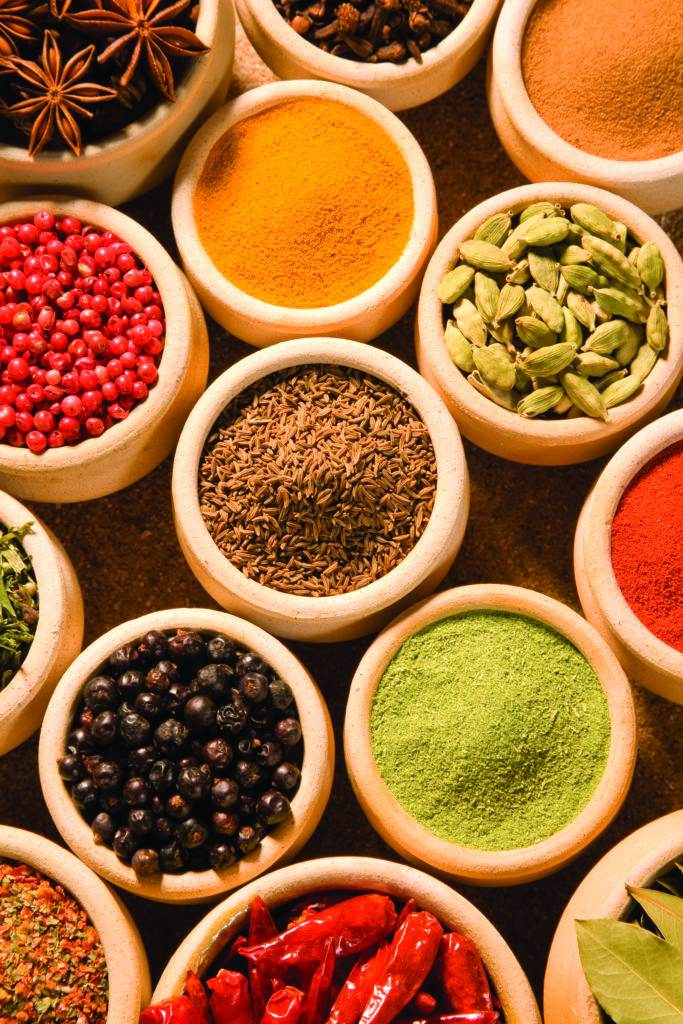A Long Torrid Romance
BY KITTY WELLS
Zip. Zest. Vitality. Rejuvenation. These are all synonyms of “spice” listed in the thesaurus. Spicy means spirited as well as sexy. Have you ever wondered why spices have such a vibrant standing in our language? Not to be bridled as a mere noun, spice as a verb fires up, gives a lift, invigorates and vitalizes. The many meanings of the word reflect the vast influence spice has had on mankind.

Spices and humans have had a long and torrid romance. In ancient times, spices from India and Indonesia made their way west to Europe. Romans and Egyptians alike were enamored of cinnamon, cloves, nutmeg, and pepper as a way to enliven their food, treat their illnesses, enhance their sex lives, and mediate between humanity and Divinity. Spices drove European desire, spurring the age of expansion and driving the world’s first global economic network. Revered by Chinese, Arabic, Persian, and Greek physicians, spices are among mankind’s first medicines, appearing in the first written medical texts of Ayurveda more than 6,000 years ago.
Spices have now captured the attention of modern scientists, who are unlocking the secrets of their powerful chemistries. The molecules that create their enticing flavors and fragrances also have powerful health-protective properties. When discussing the benefits of spices, scientists use the word pleiotropic, meaning “having many effects.” Spices’ effects are remarkably diverse, intelligent, and simultaneous, and arise from how they work with the most fundamental biological processes in your body.
Research conducted at the University of Florida, Gainesville, shows that regular consumption of spices can lower inflammation and protect your DNA from strand breakage due to free radical damage. The top four anti-inflammatory spices are turmeric, clove, ginger, and rosemary.
Research in the field of epigenetics shows that compounds in spices can influence the very expression of your genes. They trigger signals to genes that turn on protective antioxidant and anti-inflammatory enzymes and processes, and turn off those that are damaging. These magic compounds include cinnamic acid from cinnamon, eugenol from cloves, catechins from cacao and green tea, cardamonin from cardamom, gingerol from ginger, and curcumin from turmeric.
Cinnamon, ginger, turmeric, holy basil, and fenugreek stimulate cells to be more sensitive to insulin, helping to keep blood sugar stable and weight in check. Ginger, turmeric, cumin, garlic, and cayenne pepper help keep the blood thin, which supports healthy circulation and a healthy heart. Many spices help metabolize fats and sugars, support digestion, and give a healthy boost to your brain.
The key to enjoying their power is continuous sustained use—daily consumption. Ayurvedic medicine offers wonderful inspiration. In the Ayurvedic kitchen, “comfort food” does not mean mac ’n’ cheese or ice cream. True comfort foods are nutritious, nurturing, and wholesome, with generous use of turmeric, cumin, coriander, fennel, mint, black pepper, ginger, cardamom, cinnamon, nutmeg, and cayenne. As spices have both fat-soluble and water-soluble compounds, they are both cooked in oil and added to liquid portions of dishes.
A special branch of Ayurvedic treatment called rasayana, or rejuvenation, promotes longevity through nourishing the mind, body, and spirit. Rasayana therapies include detoxing, massage, yoga, meditation, and chanting, as well as foods, spices, and herbs that prevent early aging.
Special preparations of spices and herbs are often drunk as long-life elixirs. They may include fruit, milk, or yogurt. Elixirs are often referred to as “magical potions,” and indeed, the great taste, pleasurable creaminess, and exceptional health benefits of these drinks can have a rejuvenating effect on a deep cellular level. Healing elixirs nourish and balance your cells, organs, and hormones and provide sustained energy.
Inspired by Ayurveda, modern interpretations of rejuvenating elixirs include healthy fats, liquids, spices, herbs, and optional fruits and veggies. You start with this basic recipe, then mix and match to create the tastes, textures, and effects that best energize and appeal to you.
Long Life Spice Elixir
Blend your choice of ingredients in a blender until smooth:
» Spices: 1 pinch to 1 teaspoon of turmeric, ginger, cardamom, cinnamon, vanilla, clove, allspice, licorice, black pepper, grains of paradise. 1 or more tablespoons raw cacao or cacao nibs.
» Herbs: If using whole dried powdered herbs, 1 teaspoon to 2 tablespoons. If using an extract, 1/8 – ¼ teaspoon of ashwagandha, astragalus, holy basil, rhodiola, maca, eleuthero, gymnastemma.
» Healthy fat: Coconut, avocado, ghee, nuts, seeds.
» Liquid: 12-16 ounces of water; dairy, nut or seed milk; yogurt; herbal tea.
» Fruits: Use mostly low-glycemic raspberries, strawberries, blueberries, apples. Small quantities of high-glycemic fruit such as bananas, grapes, mango, papaya, peaches, watermelon.
» Veggies: Leafy greens; carrots; cooked winter squashes.
Supported by thousands of years of use and credible modern science, spices and other botanical treasures can improve your health and well-being and promote graceful aging.
Kitty Wells is a former Silicon Valley tech exec turned spice geek and formulator of Golden Goddess Turmeric Elixirs who co-founded Spice Pharm. SpicePharm.com